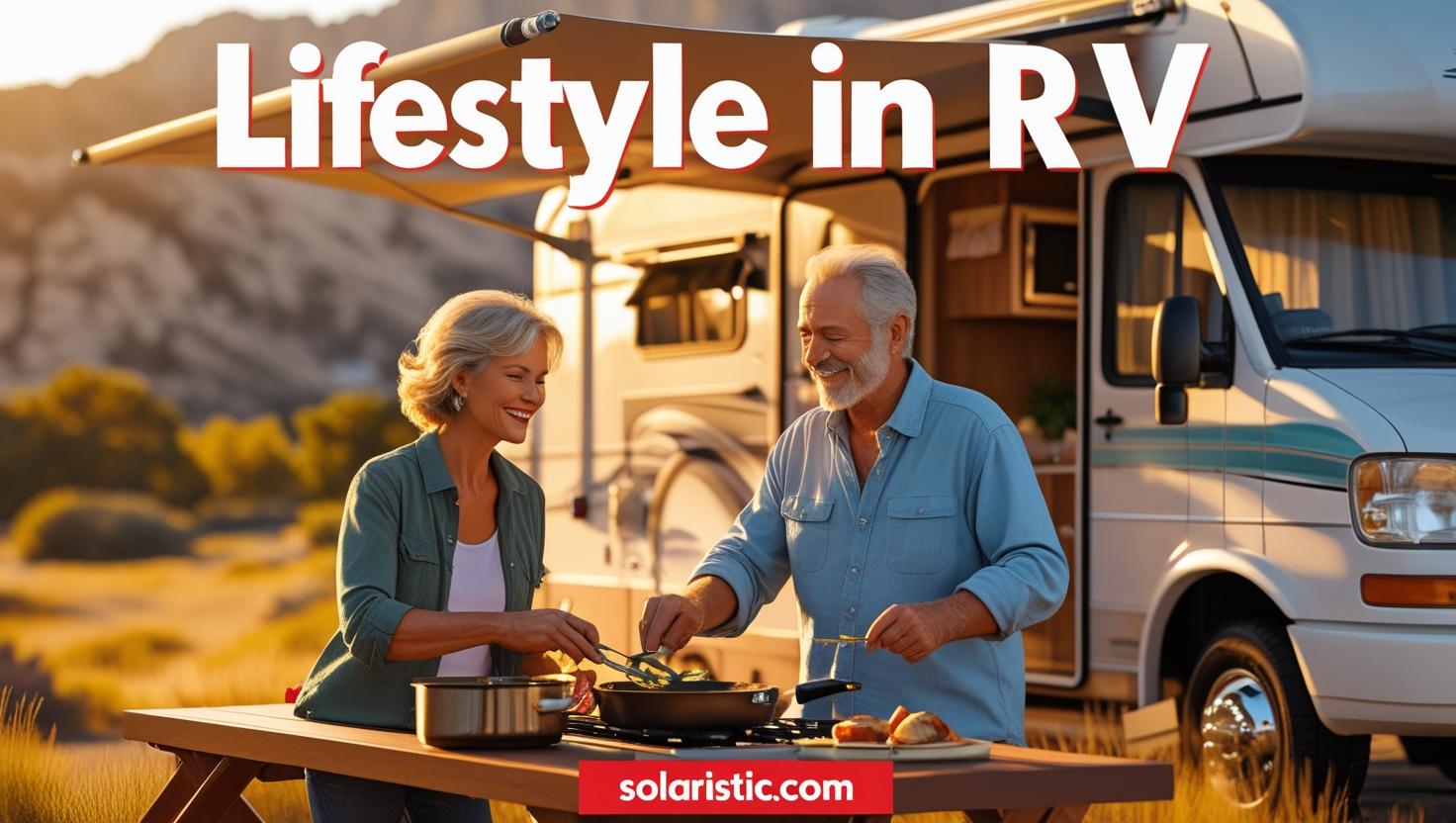Lifestyle in RV: Enfold Freedom, Adventure, Simplicity on the Road

Discover the lifestyle in RV living—own freedom, downsize your life, and enjoy adventure on the road—tips and insights for thriving in RV life.
Introduction
Living the RV lifestyle has grown increasingly popular as people seek freedom, flexibility, and a simpler way of life. Whether full-time travelers, seasonal wanderers, or weekend explorers, RV living offers a unique blend of adventure, community, and personal growth.
In this guide, explore what the RV lifestyle truly means, the benefits and challenges, and practical tips to thrive while living on wheels
What Is the RV Lifestyle?

The RV lifestyle means choosing to live, travel, and work from a recreational vehicle of any type—campervan, motorhome, travel trailer—embracing minimalism, mobility, and exploration. It’s a lifestyle defined by:
At its core, the RV lifestyle is about living, working, and exploring from a recreational vehicle—be it a campervan, motorhome, travel trailer, or fifth wheel. It involves downsizing your possessions, adopting a minimalist mindset, and embracing mobility. This lifestyle is characterized by:
- Freedom to Roam: Escape the traditional nine-to-five and permanent living situations to travel where and when you want.
- Minimalist Living: Limited space demands intentional living, focusing on essentials and meaningful belongings.
- Nature Connection: Spend more time outdoors, often waking up to breathtaking views and fresh air.
- Community Bonding: Join a vibrant community of fellow RV enthusiasts for social activities, support, and shared adventures.
- Work Flexibility: Many RVers work remotely, freelance, or engage in seasonal jobs, making location independence possible.
Benefits of Living the RV Lifestyle

RV Lifestyle Benefits
1. Freedom and Flexibility
Wake up to new views, choose your destinations, and set your own pace. No more permanent addresses or commutes!
2. Choose Your Own Schedule
Unlike traditional work and home life with fixed hours, RV living lets you set your own daily routine. Whether you prefer a slow-paced morning or an active day of exploration, you decide when to work, relax, or travel.
3. Escape the Conventional 9-to-5
RV living allows remote work, freelancing, or seasonal jobs that break free from typical office hours. This flexibility supports a better work-life balance and the chance to pursue passions alongside earning income.
4. Explore New Destinations Regularly
With no long-term lease or mortgage tying you down, you can pick fresh destinations monthly, weekly, or even daily. You’re free to chase the sun in winter, attend festivals, or avoid crowds by changing locations quickly.
5. Adapt Quickly to Changing Life Circumstances
The mobility of RV life means you can adjust your plans based on health, family needs, or economic shifts without the stress of selling property or breaking leases.
6. Take Advantage of Off-Season Deals and Weather Conditions
Flexibility lets you camp in warmer areas during colder months or quieter spots in peak travel seasons. This enhances comfort, enjoyment, and often reduces costs.
7. Freedom From Accumulating Clutter and Maintenance Hassles
Living on the road encourages keeping belongings minimal and maintaining your vehicle and home-in-one at your own pace, freeing you from burdensome upkeep common in traditional homes.
8. Personalized Travel Experience
Whether you want solitude in nature, exploration of urban centers, or socializing at RV gatherings, freedom allows you to craft a travel experience uniquely your own.
9. Spontaneity and Adventure
With no rigid plans, you can seize unexpected opportunities—a detour to a hidden gem, a new friendship invitation, or a festival—keeping life exciting and fresh.
These enhanced points underline why the freedom and flexibility of the RV lifestyle are central attractions for many, unlocking possibilities impossible in conventional living.
10. Simplicity and Minimalism
Living in smaller spaces encourages intentionality—fewer things, less maintenance, more meaningful experiences.
Simplicity refers to reducing the complexity in your life—paring down activities, decisions, and belongings to focus on what brings value and joy. Minimalism is the practice of owning and living with fewer material possessions, intentionally choosing quality over quantity.
In an RV, these philosophies are not just ideals but practical necessities. The limited space demands careful consideration of what to keep. Every item must earn its place in your life and your living space.
Why Are Simplicity and Minimalism Important for RV Living?

- Space Constraints: Unlike a house with closets and rooms, an RV has limited storage. Excess stuff quickly leads to clutter, which can feel stressful and cramped.
- Efficiency and Organization: Fewer possessions and simpler routines mean less time spent on cleaning, maintaining, and managing belongings. This frees up time and mental energy for experiences and relationships.
- Financial Freedom: Prioritizing essentials helps reduce unnecessary spending on items that don’t add real value, helping you live within budget and save for adventures.
- Emotional Well-being: Minimalism encourages detachment from material things, fostering gratitude, mindfulness, and a focus on personal growth.
- Mobility and Flexibility: Less to pack, store, or organize simplifies travel. It makes moving the RV easier and reduces stress about losing or damaging possessions.
How to Practice Simplicity and Minimalism on the Road

1. Declutter Ruthlessly
- Start by assessing every item in your RV. If you haven’t used it in the last 6-12 months or if it doesn’t serve a clear purpose, consider donating, selling, or storing it.
- Keep multipurpose items (e.g., a pot that also serves as a mixing bowl).
- Regularly revisit what you carry to avoid accumulating clutter over time.
2. Opt for Quality Over Quantity
- Choose durable, versatile, and well-made items rather than many disposables or single-use things.
- Invest in essentials that last and perform well, reducing replacements and waste.
3. Streamline Daily Routines
- Simplify meal preparation with easy, nutritious recipes using fewer ingredients and tools.
- Adopt minimalist cleaning routines suited to small spaces.
- Reduce technology usage and distractions, focusing on presence and purposeful activities.
4. Mindfully Curate Your Experiences
- Prioritize activities and relationships that enrich your life rather than accumulating material possessions.
- Focus on outdoor adventures, learning, and connecting with communities on the road.
Benefits Experienced by Minimalist RVers
- Less Stress and Overwhelm: Living with fewer items and simpler routines reduces housekeeping and worry.
- More Time and Energy: Freed-up resources are redirected to hobbies, travel, and relationships.
- Increased Creativity and Resourcefulness: Making do with less inspires innovation and adaptive problem-solving.
- Environmental Impact: Minimalism supports sustainable living with lower consumption and waste output.
- Deeper Gratitude: Appreciating what you have enhances satisfaction and emotional resilience.
Real-Life Examples of Minimalism on the Road
- A traveler carrying only 2 sets of clothes, multi-use kitchen gadgets, and digital books instead of physical ones.
- An RVer cooking simple meals with minimal utensils, relying on natural light rather than gadgets, and keeping a strict no-clutter policy on surfaces.
- Families are intentionally downsizing toys and gadgets, focusing on outdoor play and shared experiences instead.
Challenges of RV Living and How to Overcome Them
- Limited Space: Embrace creative storage, multi-purpose furniture, and regular decluttering.
- Maintenance: Learn basic RV care and set aside a budget for repairs and upkeep.
- Connectivity: Invest in mobile internet solutions and plan for offline times.
- Routine Changes: Maintain healthy habits through exercise, cooking, and socializing on the road.
Tips for Thriving in Your RV Lifestyle
1. Optimize Your Space Smartly
Make the most of limited space by using vertical storage, collapsible furniture, and multi-functional items. Regularly reorganize to keep your living area tidy and efficient.
2. Develop a Maintenance Routine
Create a preventive maintenance checklist for your RV’s engine, appliances, and systems. Regular checks avoid unexpected breakdowns and keep your home comfortable.
3. Prioritize Mental Health and Social Interaction
Living on the road can sometimes feel isolating. Schedule meetups with other RVers, participate in online communities, or attend RV rallies to maintain social connections and emotional well-being.
4. Embrace a Simplified Digital Life
Adopt minimal digital consumption to reduce stress and increase presence. Limit time on social media and emails, and enjoy nature and activities unplugged when possible.
5. Learn Basic DIY Repairs
Equip yourself with tools and knowledge to handle common repairs and troubleshooting. This reduces downtime and saves money on service calls.
6. Practice Sustainable Living Habits
Conserve water, manage waste responsibly, and reduce power consumption. Sustainable practices respect the environment and extend your ability to stay off-grid longer.
7. Cultivate Healthy Eating Habits
Stock your RV with fresh and nutritious foods. Plan simple, wholesome meals to maintain energy and health, and adapt cooking techniques suitable for a limited kitchen space.
8. Manage Finances Carefully
Track expenses and create a budget for fuel, maintenance, park fees, and emergencies. Building financial discipline helps avoid surprises and supports long-term travel.
9. Stay Informed About Weather and Road Conditions
Use weather apps and road condition alerts to plan travel and parking. Avoid hazardous conditions and ensure safety on unfamiliar routes.
10. Keep a Travel Journal or Blog
Document your experiences and memories. This can be a creative outlet, a way to share your journey, and a valuable reference for your travels.
These additional tips provide a holistic approach to thriving in your RV lifestyle, touching on space management, health, finances, safety, and personal growth.
- Plan your routes but leave room for spontaneity.
- Prioritize self-care and outdoor activities.
- Build a support network of fellow travelers.
- Keep learning about RV systems and upgrades.
Conclusion
The lifestyle in RV is about embracing freedom, adventure, and simplicity. It offers an unparalleled way to live intentionally, connect with the world, and enjoy everyday discoveries. Whether just starting or deep into life on the road, this lifestyle can transform your perspective and quality of life.
FAQs
Yes, with good planning and adaptability, many find it rewarding and sustainable.
Remote jobs, freelancing, seasonal work, and entrepreneurship are common.
Through mobile hotspots, satellite internet, and public Wi-Fi when possible.
Plan your routes but leave room for spontaneity.
Budget carefully but allow for experiences.
Prioritize self-care and outdoor activities.
Build a support network of fellow travelers.
Keep learning about RV systems and upgrades.
